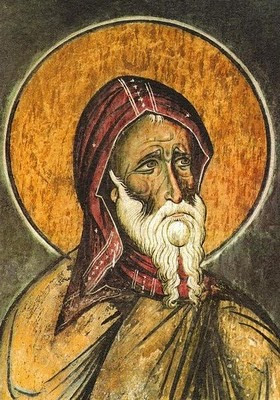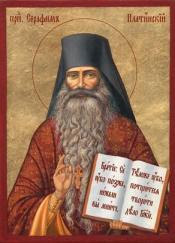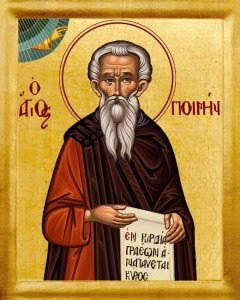St. Bessarion the Great, wonderworker of Egypt (466) "An Egyptian by birth, Abba Bessarion was initiated into the angelic life by Saint Anthony the Great. He later became a disciple of Saint Macarius, the founder of Scetis (19 Jan.), and then set out to lead the life of a wanderer, borne hither and thither by Providence like a bird by the wind. All his wealth lay in the Gospel, which he always had in his hand. Living in the open air, he patiently endured all weathers, untroubled by care for a dwelling or for clothing. Fortified by the strength of the faith, he thus remained untouched by all the passions of the flesh. "On coming to a monastery where the brethren led the common life, he would sit weeping at the gate. A brother once offered him hospitality and asked why he was distressed. 'I cannot live under a roof, until I have regained the wealth of my house,' he replied, meaning the heavenly inheritance lost since Adam. 'I am afflicted, in danger of death every day, and without rest because of my huge misfortunes, which oblige me ever to travel on in order to finish my course.' "He wandered for forty years without ever lying down to sleep, and he spent all of forty days and forty nights standing wide awake in a thorn bush. One winter's day, he was walking through a village when he came upon a dead man. Without hesitation, he took off his own coat and covered the body. A little further on, he gave his tunic to a poor man who was shivering in the cold. An army officer, who happened to be passing, saw the naked ascetic and wanted to know who had stripped him of his clothing. 'He did!' replied Bessarion, holding up the Gospel Book. On another occasion, he met with a poor man and, having nothing to give him in alms, he hurried to the market in order to sell his Gospel Book. On his disciple's asking him where the Book was, he replied cheerfully, 'I have sold it in obedience to the words which I never cease to hear: God, sell what you possess and give to the poor (Matt. 19:21). "Through this evangelic way of life he became a chosen vessel of Grace, and God wrought many miracles through him. One day, for example, he made sea water sweet through the sign of the Cross, to quench his disciple's thirst. When the latter wanted to keep some for the remainder of the journey, he prevented him, saying, 'God is here, God is everywhere!' At another time, having stood for two weeks in prayer with hands raised to heaven, he brought about rain enough to fill a thirsty brother's coat. Then there was the time when he stopped the sun from setting until he reached the cell of an elder whom he wished to meet; and the time when he walked across the waters of a river. Through these and many other wonders wrought by the Saint, God showed, as He did with Moses, Joshua and Elias, that He grants His servants mastery even over natural phenomena. Through the power of Christ, he raised a paralytic, drove out demons and showed himself truly to be a 'god' upon the earth. "When, having reached his goal, he was at the point of regaining that dwelling in heaven which he had sought throughout his wanderings, he said to those about him, 'The monk ought, like the cherubim, to be all eye.' "In answer to a brother who asked what a monk living in community ought to do, he replied: 'Keep silence and do not measure yourself.' Indeed, this is how even in the midst of people one can obtain the grace of the great anchorites." |
Joypeacehope fading - Light of day waning - Dark of night waxing - Saddened heart weary - Brightened eyes dimming - God have mercy
Friday, March 5, 2010
Saturday, February 27, 2010

Tuesday, February 23, 2010

You Must Become Like A Little Child To Enter The Kingdom Of Heaven
Tuesday, February 16, 2010

Righteous Simeon the God-Receiver Righteous Simeon the God-Receiver was, according to the testimony of the holy Evangelist Luke, one of the chosen of God in expectation of the consolation of Israel, and the Holy Spirit dwelt upon him (Lk 2:25). It was announced to him from God, that he would not die until that time, when the Promised Messiah – Christ the Lord – would be come into the world. Ancient historians relate that the Egyptian emperor Ptolemy II Philadelphos (285-247 BC) wished to add to the famous Library at Alexandria with texts of Holy Scripture. He invited scholars from Jerusalem, and the Sanhedrin sent their wise men. Righteous Simeon was also among the 72 scholars in Alexandria for the translation of the Sacred Scriptures into the Greek language. |
Friday, February 12, 2010

"For creation, as if written in characters and by means of its order and harmony, declares in a loud voice its own Master and Creator.... For this reason, God, by his own Word, gave creation such order as is found therein, so that while He is by nature invisible, men might yet be able to know Him through His works."
Saint Anthony the Great 251-356 A.D.
Thursday, February 11, 2010

St. Andrew (Rublev) of Russia, iconographer (1430) Many consider him the greatest iconographer of all time, and his "Holy Trinity" the finest icon. Very little is known of his life. He was born around 1360, and probably studied with the Byzantine iconographer Theophanes the Greek. He is known to have created icons for the Cathedral of the Annunciation in Moscow and the Cathedral of the Dormition at Vladimir. He created a highly spiritual and distinctively Russian iconographic style that set the standard for Russian iconography for centuries thereafter. It is said that he knew St Sergius of Radonezh (July 5). In his later years he became a monk. |

Friday, February 5, 2010
Monday, February 1, 2010
Friday, January 29, 2010
Wednesday, January 27, 2010

Tuesday, January 26, 2010
Atmospheric Corruption
Monday, January 18, 2010

"May the Lord Jesus, Who said: 'Ask, and ye shall receive' (John 16:24), grant all your requests. Only prepare your house, and sweep it thoroughly to receive the Divine gifts. They remain secure only where there is no impurity. He who tastes of them becomes a stranger to the old Adam; he becomes crucified to the world as the world is to him, and lives always in the Lord."
Saturday, January 16, 2010

St. Genevieve of Paris (502)
Thursday, January 14, 2010

Monday, January 11, 2010

The Holy Martyred 14,000 Infants
Saturday, January 9, 2010

Tuesday, January 5, 2010

Saturday, January 2, 2010
 The Synthetic Christ
The Synthetic ChristWe moderns have done with Christ, the same as we have done with everything else in this world in which we exist. We have taken the seed of life, sliced it, dissected it and studied it, taking a bit of it for our own and then from that little bit of real life, we have created a synthetic look a like. In the midst of a world created by God for our benefit, we have done the same thing with all of life. We have refused His ways, insisting on creating our own world, our own food, our own medicine, our own clothes, our own religion, our own way of life, living apart from God yet deluding ourselves into thinking this is reality. We have rejected the true God and created an imitation. We have rejected the real world and created an toxic placebo. We have rejected the real purpose for which man has been put upon this earth and embraced a delusion that appears real and feels real but is really just a computer generated image. Pull the plug and it disappears for it has no depth and no connection with a sustainable energy source. We moderns have built a tidy, shiny, impressively appearing civilization on lies, distortions, half truths and delusions. We have become masters at imitating and counterfeiting truth and reality. We have convinced ourselves and the world around us that our creation is reality and that the authentic reality is inadequate to sustain life. We moderns call our rebellion; freedom and enlightenment. The old world, the ancient world, the world of our fathers is of no use to us and must be destroyed for it ties us to the past which keeps us from embracing that hope which is to come. The shining star that led the wise men of the East to Christ, has been replaced with a new star that is leading the wise men of our age to the antichrist and the new world order. The purveyors of this new world order are re-creating civilization, the world and the universe to satisfy their egos and the masses have been become intoxicated with their strong drink. In our drunkenness, we have been incited to rape the virginal maidens of beauty and truth. We have burned to the ground the ancient traditions that were the pillars of our faith. We have pillaged the glorious treasures that through the ages have sustained us in times of famine and war. Our society has entered into a period of desolation and abomination from which there is no return.
This is a time in which the inhabitants of the heavenlies, the Holy Trinity, the Mother of God, the saints of old with all the holy angels look mournfully upon the earth. Yet in their mourning for our souls, they are ready and able to save those of us who perhaps will come to our senses to call out to the heavenlies for salvation so that we might escape from this insanity of life, we call modernity.
Friday, January 1, 2010
Sainted Gregory, Bishop of Omiritia (North Africa)

...When he finished the prayer, the earth quaked, and in the East the heavens were opened up, and in a radiant cloud, amidst flaming and fiery rays of light the Lord Jesus Christ came down on earth, and thus was heard the Voice of the Lord: "On account of the prayers of bishop Gregory be ye healed of My Crucifixion by your fathers".
Like unto Saul before his becoming Paul, who on the Road to Damascus was struck blind by the Heavenly light, the Jews here were struck blind and they implored the holy bishop to heal them. In receiving holy Baptism, all of them were healed. Rabbi Ervan received the Christian name Leo (meaning "lion")...click on title for the rest of the story.


